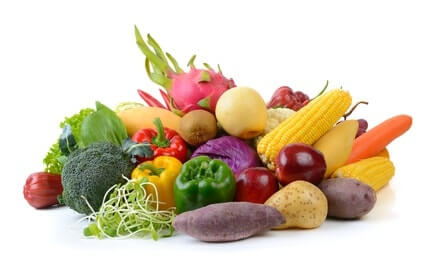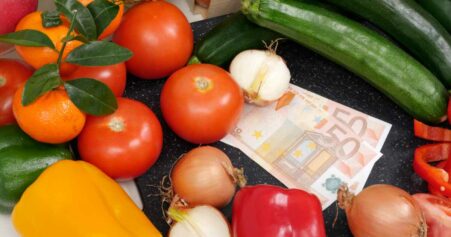Table of Contents
Vegan alternatives: Veggie burgers, soy sausages, and seitan chunks are making vegan hearts beat faster, because even former meat eaters can still enjoy the taste of meat with today’s meat alternatives. Maybe you are one of the people who have recently decided to go plant-based or completely vegan, whether for health, ethical or environmental reasons. Now you are inundated with the enormous variety of vegan products in the supermarket, and you’re wondering: How healthy are they and what can I do with them? It is not uncommon to be confused by the ingredient list.
Vegan alternatives – a trend for greater awareness or industrial window dressing? We have investigated these questions and would like to give you answers from a nutritional point of view.
Alternatives for Meat and Co: What Is It All About?![Vegane Ersatzprodukte]()
Interest in vegan diets is growing steadily and is much more than a seemingly fleeting fashion trend. World-wide, the proportion of vegans on the total population is estimated to be between 1 and 9 %. The global vegan food market is about 15.8 billion U.S. dollars in 2021 (statista, 2023).
You have decided to give up meat, fish, cheese, milk, yogurt, eggs and now you are wondering what to eat in the future? The answer can be found in the supermarket, where vegan alternatives are no longer only available in the health food section. However, it is not only vegans who are attracted to these products. Vegetarians and, to some extent, omnivores are also becoming familiar with vegan (meat) alternatives. The market for products labeled “vegan” has been growing steadily in recent years and accounts for 18.7 % of all new product launches in 2021 (Schaak et al., 2015; Mintel.com, 2022). According to the BMEL Nutrition Report, 8 % of the approximately one thousand German respondents consume vegan alternatives at least once a day (BMEL, 2022).
This may be due in part to the public statement by the WHO that there is a probable association between red meat consumption and the development of colon and rectal tumors (IARC, 2015). This moves some to reduce their meat consumption. Then vegan alternatives for meats make the transition easier.
The tried-and-true base for alternatives, known to most as the “meat of vegetarians”, is tofu: a low-processed product that definitely enhances the meatless diet with the high-quality amino acid composition of the soybean. However, its unprocessed taste and texture do not come close to that of meat. It still needs to be processed. The term “soy” may make some people wary, whether it is because of allergies, genetic engineering, or questionable sustainability. Is soy really the ultimate vegan food?
Is Soy the Answer?
The legume is a popular raw material for the production of vegan alternatives, not least because of its high protein content or high-quality amino acid spectrum. Of course, there are also economic advantages behind the high production and sales volumes; after all, soybean occupies the world’s largest arable land among oilseed crops and is the most popular animal feed in agriculture (Meinert and Stollt, 2012).
However, there are two sides to every coin: due to its high protein content, soy protein can be a potential allergen in our bodies. However, some people simply do not like the taste of soy products, such as the soy drink in coffee. Others question the sustainability and genetic modification of soy and therefore reject such products. When buying soy products, it is advisable to look for local soy. By the way, the ecologically devastating consequences of soy cultivation are caused much more by the production of animal feed than by the production of tofu and soy drinks.
Of course, soy is not the only and best vegan alternative for every consumer. Nowadays, there are a number of vegan alternatives based on other legumes, grains, or nuts: pea protein, rice, oats, spelt, almonds, hazelnuts, or cashews – there is something to suit every taste and individual tolerance.
Vegan Alternatives: Ingredients
 Vegan meat alternatives are usually made from soy, lupine, or seitan (wheat protein). Vegan cheese alternatives are either made from processed nuts or, in the form of cheese slices, are a mixture of potato starch, vegetable oils, and various additives. When it comes to milk and yogurt alternatives, you will find the aforementioned wide range based on grains, nuts, or legumes. “Eggs” can easily be replaced with chia or psyllium husks soaked in water, or in the form of banana or apple puree. In more processed products, you will usually find additional additives such as flavors, flavor enhancers, and preservatives. They ensure that the product looks and tastes similar to the product of animal origin.
Vegan meat alternatives are usually made from soy, lupine, or seitan (wheat protein). Vegan cheese alternatives are either made from processed nuts or, in the form of cheese slices, are a mixture of potato starch, vegetable oils, and various additives. When it comes to milk and yogurt alternatives, you will find the aforementioned wide range based on grains, nuts, or legumes. “Eggs” can easily be replaced with chia or psyllium husks soaked in water, or in the form of banana or apple puree. In more processed products, you will usually find additional additives such as flavors, flavor enhancers, and preservatives. They ensure that the product looks and tastes similar to the product of animal origin.
Nutritional Evaluation
Opinions are divided when it comes to vegan alternatives: Some object to the alleged “chemistry” and consider it “unhealthy” and unnecessary, while others love the taste and are happy to include them in their diets. Scientists at the IFANE (Institute for Alternative and Sustainable Nutrition) have addressed this issue by analyzing the nutritional value of 80 meat-free substitutes and 27 meat or sausage alternatives on the German market in 2017. Parameters such as protein and energy content, fatty acid spectrum, salt content, and more were examined.
In a head-to-head comparison, the vegan alternatives studied scored better than their meat-based counterparts on several criteria. They contained less of the in large amounts harmful saturated fats, were richer in protein on average, and the production of vegan products is on average less harmful to the environment. This means that their production requires fewer resources, such as water and land. They contain less pesticide residues, hormones and antibiotics, which accumulate in the animal’s body and end up in the meat product. Thus, vegan alternatives bring a handful of benefits as seemingly chemical imitations of meat, at least compared to processed meat products (Huber and Keller, 2017). However, it is important to keep in mind that the selection of vegan alternatives is now vast, and there are wide variations in ingredients and nutritional values. Some are high in protein and fortified with nutrients, therefore helping with improving the nutritional status. Cheese alternatives, on the other hand, are usually just starches and vegetable fats or oils. Without fortification, they provide only energy.
Organic vs. Conventional
In this study, a distinction was not only made between vegan, vegetarian and meat-containing products, the criterion of organic versus conventional production was also decisive. The scientists came to the following conclusion: organic products generally contained no or hardly any additives and flavor enhancers, and more frequently contained more saturated fatty acids and higher salt contents than conventional products. However, the composition of the vegan alternatives varied greatly.
Ethical And Environmental Aspects
Although vegan alternatives should not be the basis of your diet, they deliver more benefits than meat and sausage, not (just) from a nutritional perspective. If you have chosen veganism for ethical or environmental reasons, you are betting on the right cards in these aspects as well. Both the issue of animal rights and the global problem of environmental damage and climate impact are positively affected when you choose to put the vegan alternatives on our plate. But: the energy input for vegan cutlets and minced meat is of course higher than for local legumes due to the necessary processing.
Are Vegan Alternatives Healthy or Unhealthy?![Kalzium vegan]()
The advantages mentioned may sound very promising at first glance. However, the IFANE study also shed light on possible disadvantages of imitation meat, among which the high salt content in particular falls. Although the content of saturated fatty acids in the products studied was lower than in meat, the fatty acid spectrum is still often not so favorable. This is because the content of polyunsaturated fatty acids is low on average and the fat content is often quite high overall.
So how can you tell the nutritional quality of a product? By taking a closer look at the list of ingredients and the nutrition facts panel. Prefer products with micronutrient-rich ingredients higher up on the ingredient list and those that are fortified with micronutrients, such as iron, calcium, and possibly vitamin B12 and vitamin D (but you should supplement these two anyway). A high protein content and lower fat content as well as a lower energy content is considered positive for most people. Ultimately, of course, your overall diet is what counts. You will certainly also notice the daily veggie-meat in your wallet because the products are usually not cheap.
So how do vegan alternatives products ultimately rate? Above all by the ecological and ethical plus points they should be preferred definitely to the processed meat products. The advantage: Even people who like the taste of meat must renounce nothing and have a good alternative to the meat. Especially when transitioning to a vegan diet, vegan alternatives can be quit helpful. The basis of the vegan diet should be unprocessed vegetables, grains, fruits, legumes and nuts, which you can supplement with alternative products. They can convince one or the other mixed foodist to reach less for meat and co, because curiosity is often the decisive factor that such a product ends up in the shopping cart (BMEL, 2022). For convinced vegans, they can make the diet easier and more pleasant. If they help with meeting your nutritional needs, there is nothing wrong with including them in your diet. The type and proportion determine whether the overall diet is healthy or unhealthy.
Conclusion on Vegan Alternatives And Their Benefits
The number of vegans is growing – and with it the range of vegan alternatives. Whether burgers, sausages or cold cuts – soy, seitan & Co. make it possible. When thinking about vegan alternatives, many may wonder what it is for and whether such products still contain healthy ingredients or if they are even harmful.
In fact, according to a scientific study, vegan alternatives are better than their meat counterparts in many ways. Low saturated fat and above all a more environmentally friendly and ethically justifiable production are the main advantages. For an easier transition to a vegan diet, to meet the taste preferences of meat lovers and maintain social habits, vegan alternatives are ideal. However, they should be consumed in moderation and as part of a nutritious diet, as they often lack important ingredients for a balanced and healthy diet.











Leave a Reply